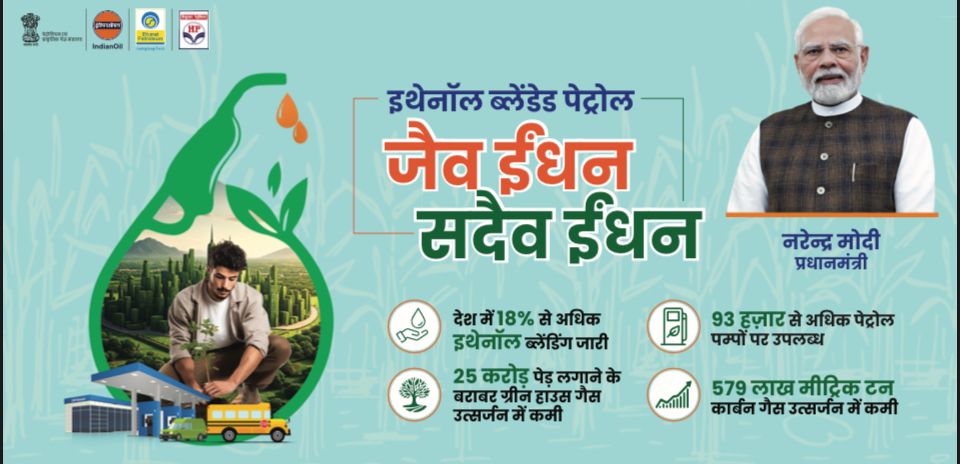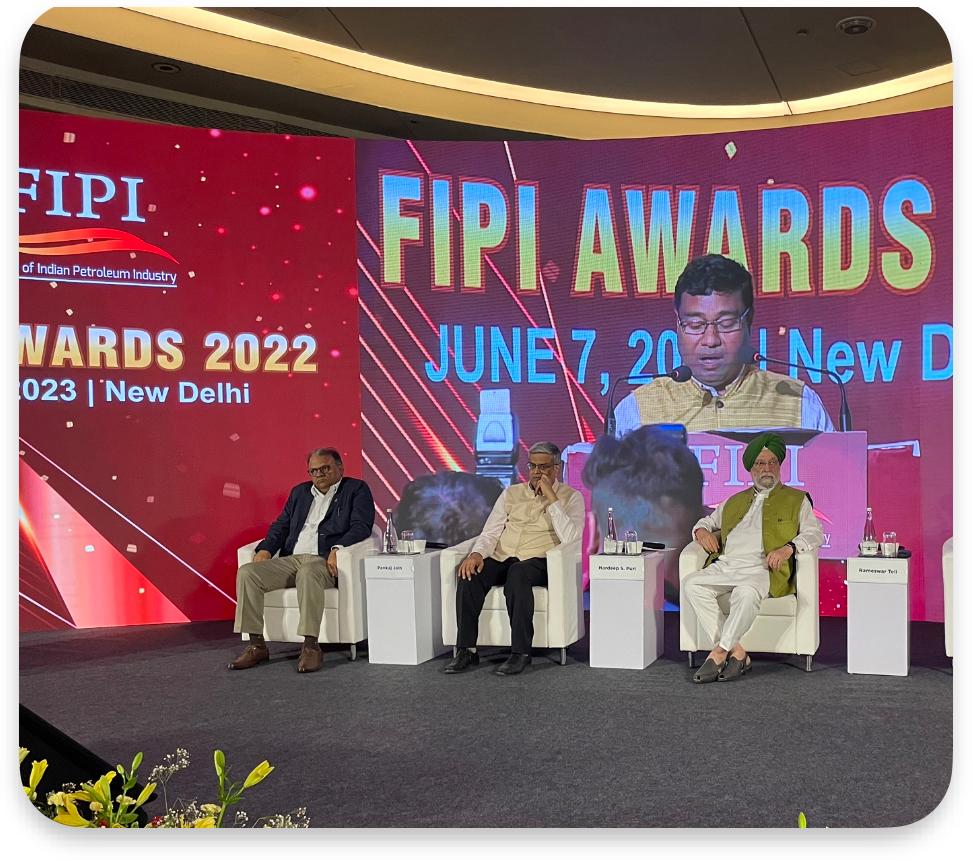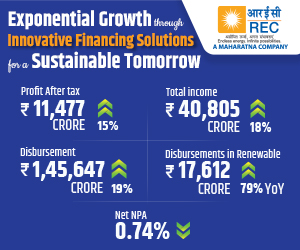FIPI holds gala Annual Awards Function in New Delhi


New Delhi: Speaking on the occasion of the award giving function of FIPI, the Hon’ble Minister for Petroleum & Gas. Mr Hardeep Singh Puri said – The Cabinet has approved a series of critical gas pricing for reforms.
FIPI organized its glittering award function ceremony yesterday at Hyatt Regency Hotel in New Delhi. The function was attended by Awardees and many corporate captains of Oil & Gas Industry.
Mr. Hardeesp Singh Puri and State Minister Mr. Rameshwer Teli had participated.
Prominent current CMDs of Oil & Gas PSUs too attended this function. The inauguration welcome speech was given by FIPPI Chairman Mr. Sandeep Gupta (CMD) GAIL.
Mr. Minister Hardeep Singh Puri expressed his views about FIPPI and said that this is the second FIPI award function that he is attending.
The FIPI Oil and Gas Awards is an annual gathering, honouring the leaders in the Oil and Gas industry. These awards constitute all the primary segments of Hydrocarbon Industry, i.e. upstream, midstream, and downstream segments. 

This year more than 20 award categories including recognition to Phd. thesis from FIPI student chapters in new energy areas were given away. For selection, FIPI awards have been reviewed and evaluated by an ‘Awards Committee’ headed by Shri G.C. Chaturvedi, Former Secretary along with EX CMDs of Oil and Gas Industry. The recommendations of the Award Committee are reviewed by the Jury Committee consisting of eminent scientists- Dr. Anil Kakodkar and Dr. R. A. Mashelkar along with EX CMDs of Oil and Gas Industry.
He also complimented FIPI for taking prompt action on his suggestion of felicitating the new clean energy initiatives taken up by Indian Oil and Gas Companies. 
With India being the third largest consumer of crude oil and petroleum products in the world and being the second largest refiner in Asia after China, the Indian hydrocarbon industry is gravitating towards a new arena of development. Further, a 7.2% economic growth in FY 2022-23, indicates resilience in India’s economy despite multiple global headwinds during the year arising from economic and geo-political uncertainties.
India is undertaking an ambitious journey of energy transition culminating in India achieving ‘Net Zero Carbon’ by 2070. However, for the transition to be enduring and stable, it is imperative that the accessibility and affordability aspects of energy remain intact.
While we are only one of the G20 countries on course to achieve its Paris ambitions, we are also aware that in the coming decades, India’s energy base load will be met by hydrocarbons. In this context, Government of India has undertaken landmark reforms in the upstream, midstream, and downstream sectors of Hydrocarbon industry in India. Recently, in a major policy reform giving fresh impetus to gas sector, the Cabinet has approved a series of critical gas pricing reforms. These reforms are aimed to lay foundation of a sustainable, affordable, and secure energy future for Indian citizens.
In lack of these decisions, gas prices would have been uncompetitive to alternative fuels and hindered the expansion of the gas-based economy. The prices of gas for priority consumers would have increased by about 10% in the next half-year and continued to rise in the subsequent periods. 
Now the APM prices will be determined monthly at 10% of the average Indian Crude Basket Prices, with a ceiling (US $6.5/MMBTU) and floor (US $4/MMBTU). The ceiling will remain the same for the first two years and then increase by US$0.25/MMBTU every year, to adjust for any cost inflation.
These reforms will also incentivize investment in India’s E&P sector by ensuring that gas production from new wells of nomination fields will receive 20% higher prices. These reforms will not impact private operators of NELP/HP-HT fields or new gas production from field development plans submitted after February 2019.
General public has already started reaping the benefits of this decision. We have already seen that the average cost of PNG has been reduced by about 10% and CNG has seen a 6-7% reduction in prices. As a developing country which imports 85% of its demand for oil and close to 50% of its demand for natural gas, we are acutely aware of the need for a just and stable energy transition.
Government plan has 4 planks: – (i) Diversification of supplies (ii) Increase of alternate energy sources like Biofuels, Ethanol, CBG and Surya Nutan (iii) Increasing E&P footprint (iv) Energy targets through EVs & Hydrogen.
India has one of the largest synchronous grids in the world, capable of handling intermittent renewable energy and we have achieved One Nation-One Grid-One Frequency. We have enacted Green Hydrogen Policy with a production target of 5 million tonnes by 2030 and related development of renewable energy capacity. Global Alliance on Biofuels, along with USA and Brazil has been launched during India’s Presidency of G20.
The energy transition, with its requirement of combining disruption and scale, will only be truly successful when all stakeholders, big and small, collaborate to complement each other’s strengths through the creation of symbiotic relationships and strong ecosystems. We must realise that this journey is about creating comprehensive strategies for the future. He said.
The function seemed to be instrumental in bringing current and ex thought leaders of the Oil & Gas Sector. It’s a much looked forward to event and is a landmark achievement of FIPI. Team NewsIP wishes the very best to FIPI for it’s future endeavours.





